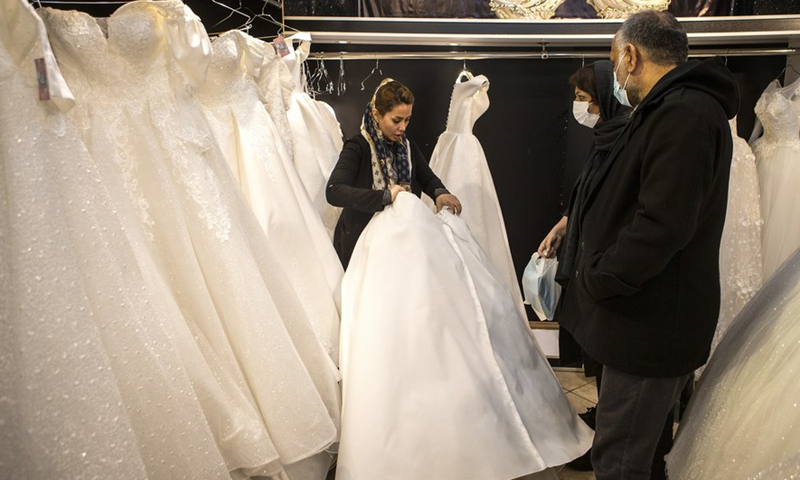COVID-19 changes wedding plans for Iranians

People shop at a wedding dress store in Tehran, Iran, on Jan. 28, 2021. (Photo by Ahmad Halabisaz/Xinhua)
For many Iranians who look to tie the knot, they have been forced to make changes and adjustments to their wedding plans, facing obstacles brought about by the COVID-19 pandemic.
"We had planned to hold our wedding in the summer last year, but after the COVID-19 epidemic was reported in our country and then people started to avoid gatherings with closure of banquet halls, we had to delay our wedding," said Mina Alikhani, who was engaged with her fiance Javad Mousavi.
"I heard some weddings of my friends and colleagues were also postponed like ours, waiting for the halls to reopen," said Alikhani.
Psychologist Zahra Heydari, a senior official in charge of marriage and family counseling centers at Iran's Ministry of Sports and Youth, told official news agency IRNA that many marriages had been delayed due to the COVID-19 outbreak.
Postponement reduces the motivation of young people to live together, and increases their anxiety and stress due to the ambiguous situation regarding family and social relations, and the adherence to health protocols, all of which affects the intimate relationship of couples, said Heydari.
Instead of postponement, some couples turn to have a simplified wedding rather than a traditional one which usually features a large gathering of guests and a grand ceremony.
Ali Reza and Mahrokh said they were sad and disappointed at the beginning of the epidemic. They had planned to marry last year, but the COVID-19 ruined the plans.
Their families would not accept renouncing to a big wedding during the first several months after the virus outbreak. However, later on, they chose to hold a small ceremony with a very limited number of guests.
Ali Reza and Mahrokh are just one of the Iranian couples who were forced to change their plans and chose to embrace a simple wedding amid the COVID-19.
Some suggested a bright side of this change. Eagerness for opulent ceremonies in some families has actually been a major obstacle to marriage and family formation, as Azam Karimi, Director General of Planning and Social Development at Iran's Ministry of Sports and Youth pointed to Etemad daily.
She believed that this period of time could be taken as "a chance to change lifestyle."
Statistics from Iran's Ministry of Sports and Youth show that some 200,000 marriages had been registered in the first four months of the current Iranian year (March 20 to July 21, 2020), compared with some 167,000 marriages in the same period of the previous year.
Iran's health ministry reported 6,608 daily COVID-19 cases on Wednesday, raising the total nationwide infections to 1,392,314.
